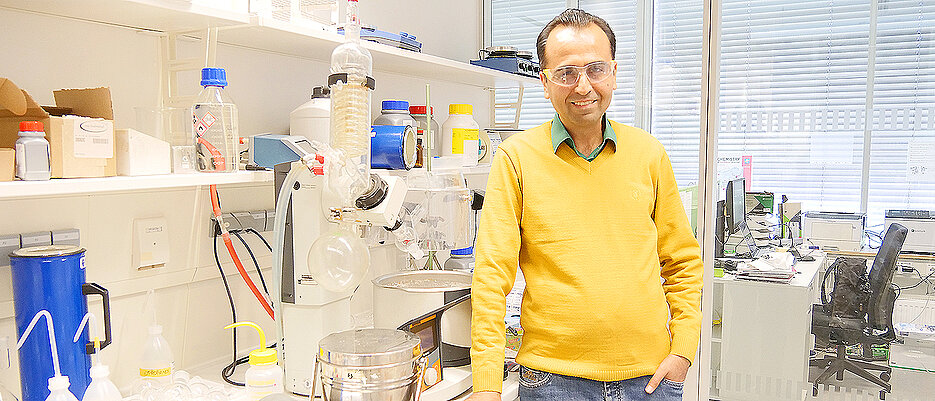Using chemistry for renewable energy

Dr. Hamid Reza Shahsavari is researching new sources of renewable energy from compounds of metals and hydrocarbons. He is currently at the University of Würzburg on an Alexander von Humboldt Fellowship.
“There's chemistry all around us!” Dr. Hamid Reza Shahsavari still remembers this sentence from his teacher at high school. He has been fascinated by the subject ever since and decided to study chemistry at the University of Shiraz in Iran.
His path eventually led him to Julius-Maximilians-Universität Würzburg (JMU): Since June 1, 2025, he has been a guest of Agnieszka Nowak-Król, Professor of Inorganic Chemistry of Boron-Containing Functional Materials, and Todd B. Marder, Senior Professor of Inorganic Chemistry. The stay is made possible by an 18-month fellowship from the Alexander von Humboldt Foundation.
Shahsavari chose to stay in Würzburg for several reasons: "The University of Würzburg offers the ideal research environment with state-of-the-art laboratory technology. The expertise of Professor Nowak-Król and Professor Marder in organometallic chemistry also helps me immensely," says Shahsavari. The former is a rising star in chemistry anyway.
Exploring new sources of sustainable and renewable energy
In the field of organometallic chemistry, researchers are working on bonding of organic compounds - primarily carbon compounds - to metal atoms. In this specialist area, the Humboldt Fellow is working on the metalation of pyridyl-pyrene and azahelicenes.
“These are also known as a category of aromatic hydrocarbons,” says the chemist. In Würzburg, he wants to synthesize special complexes from these hydrocarbons and various metals such as platinum. He will then examine their optical properties.
"The project has the potential to create new materials for optoelectronic devices. These include organic LEDs and organic photovoltaics, for example," says the scientist. The aim is to contribute to the development of new sources of sustainable and renewable energy.
About the person
Born in Estahban in Iran in 1984, Hamid Reza Shahsavari studied chemistry at the Shiraz University in Shiraz (Iran), from 2002. He also received his doctorate there in 2012.
In his academic career to date, he has completed several international research stays. These include scholarships at the universities in Logroño (Spain), Bari (Italy), Fayetteville (Arkansas, USA) and Pisa (Italy).
Since 2013, he has been working as a permanent faculty member at the Institute for Advanced Studies in Basic Sciences (IASBS) in Zanjan (Iran). He is currently at JMU with an Alexander von Humboldt Fellowship. In 2022, he spent four months at JMU as a fellow funded by the Siebold-Collegium Institute for Advanced Studies (SCIAS).
Contact
Dr. Hamid Reza Shahsavari, Chair of Inorganic Chemistry I, hamid-reza.shahsavari@uni-wuerzburg.de; hamidreza.shahsavari@gmail.com

